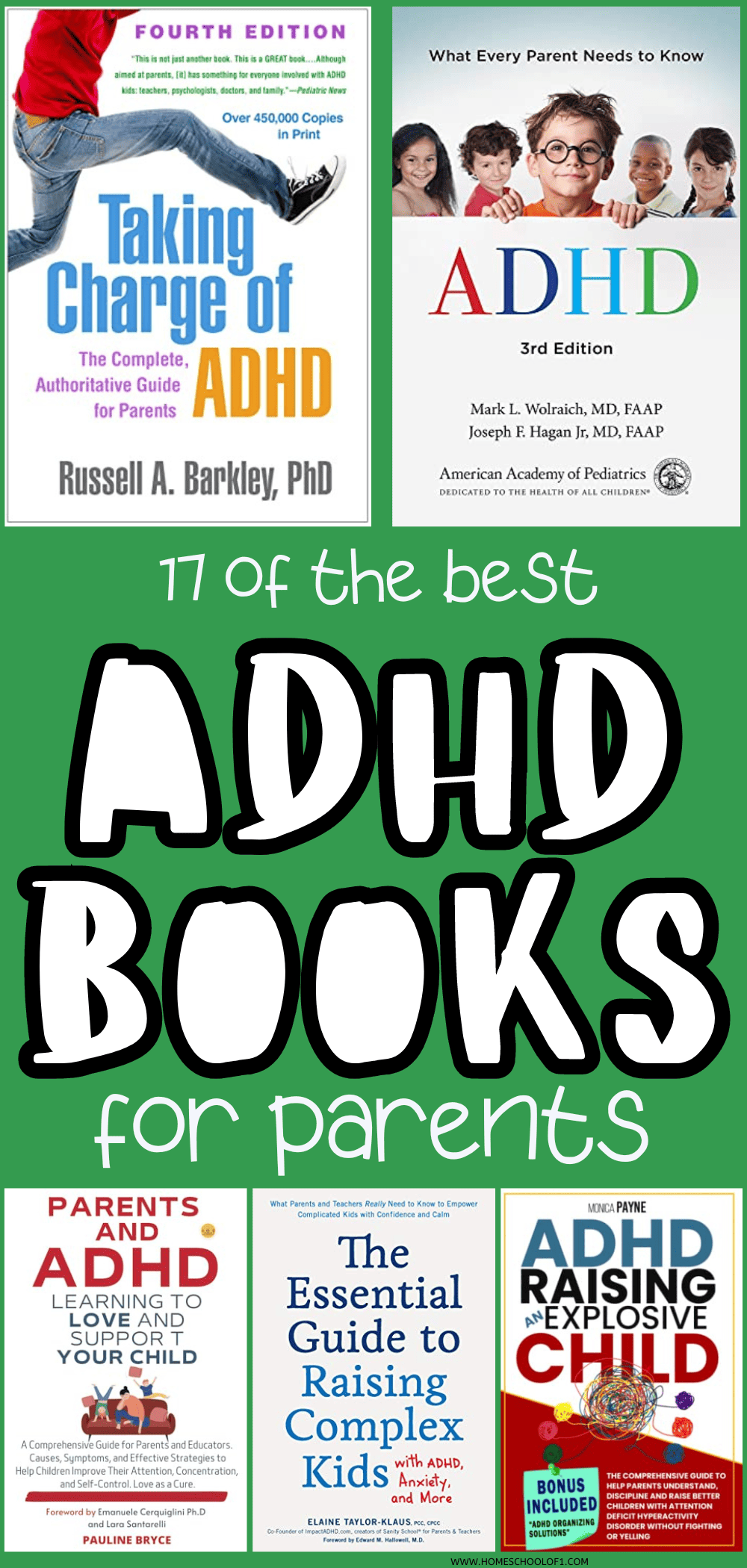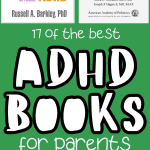Top 17 ADHD Books for Parents to Help Kids Thrive in 2025
I know firsthand that parenting a child with ADHD can be tough. So, I recommend checking out the best ADHD books for parents. They’ll provide essential guidance to help you navigate this challenging journey.
My son was diagnosed with attention deficit hyperactivity disorder (ADHD) when he was 9 years old. We had already realized there was something special as we had decided to homeschool him a year before when he was struggling in the classroom.
These neurodivergence books have helped us so much through the years. As we are homeschooling a teenager now I can honestly say without these books we would all be struggling!
These cover some fantastic tips for homeschooling a child with ADHD.

**This post may contain affiliate links. As an Amazon Associate and a participant in other affiliate programs, I earn a commission on qualifying purchases.**
Top Books About ADHD for Parents
Raising neurodivergent children can be a challenging yet fulfilling journey. These handpicked ADHD books have been our lifelines. Offering indispensable wisdom and strategies that have truly transformed our homeschooling experience.
They have loads of practical tips that have empowered us to manage ADHD-related challenges with confidence and compassion and have made me a better parent.
Whether you’re homeschooling a child with ADHD or just seeking emotional support. These great books are essential companions on this rewarding, albeit occasionally tough, parenting adventure.
When our son was first diagnosed, this book by Russell A. Barkley became a trusted guide. Barkley breaks down complex ideas into practical advice, helping us feel more in control of daily challenges. His insights not only gave us strategies for managing behaviors but also helped us better understand our son’s needs. It’s a must-read for parents looking to build a positive, supportive environment.
Written by pediatricians Mark L. Wolraich and Joseph F. Hagan, this book offers straightforward, reliable information. When we were just starting out, it was comforting to have such a clear guide to ADHD.
It helped us understand the condition and gave us practical tools to support our child through different stages. It's a valuable resource we’ve returned to many times.
This book emphasizes seeing ADHD as a difference, not a flaw. The 48 actionable strategies offered us new ways to foster our child's self-esteem and focus on his strengths. As a family, we’ve found that small, intentional changes can make a big impact, and this book has been a helpful companion in that process.
Related: Best puzzle books for ADHD kids
Pauline Bryce’s book offers more than just strategies—it focuses on the emotional side of parenting. It reminded us that love and patience are just as essential as structure.
Published in 2023, it feels fresh and relevant, offering new perspectives that have encouraged us to approach parenting with more compassion.
Part of the Thriving Beyond Labels Toolbox series, this book has been a game-changer. It provides tools to manage outbursts, build routines, and create a nurturing environment. Since incorporating its advice, our home life has felt more balanced, and we've seen real progress in our child’s emotional regulation.
Related: Best toys for ADHD
Part of the Thriving Beyond Labels Toolbox series, this book has been a game-changer. It provides tools to manage outbursts, build routines, and create a nurturing environment. Since incorporating its advice, our home life has felt more balanced, and we've seen real progress in our child’s emotional regulation.
Raising a boy with attention challenges brings its own set of unique challenges, and this book by Sarah Davis and Linda Hill has been a lifesaver. It gave us practical tips on improving focus, managing behavior, and teaching social skills. The advice is tailored specifically for boys, which made it feel especially relevant to our experience.
Raising girls with focus and impulse issues can look different, and Richard Bass’s book captures these nuances well. It gave us insights on how to respond to different behaviors across various stages, from childhood through adolescence. It’s been a great resource for any parent looking to support their daughter’s development.
This homeschool workbook by Lawrence E. Shapiro is more than just activities—it has been a powerful tool for building confidence and social skills in our child. Working through the exercises together gave us insight into his thought process and helped him feel more in control of his emotions. It’s been an essential part of our routine.
Chloe J. Boulding’s book provided practical ways to handle emotional outbursts and helped us understand the root causes of our son’s explosive behaviors. The strategies felt doable, and we’ve already noticed how they’ve improved family dynamics. It’s a great resource for parents dealing with emotional challenges in their children.
This guide gave us a new perspective on parenting through high-stress moments. It helped us develop healthier routines and taught us to approach difficult behaviors with empathy. By applying its advice, we’ve seen improvements in both our child's self-control and our ability to stay calm under pressure.
Dr. Sharon Saline’s book gave us insight into our child’s perspective, helping us build a stronger relationship based on understanding. It reminded us that collaboration with our son is key to his success at home and in school. This book has been an eye-opener, showing us how to better communicate and connect.
Related: Best math curriculum for ADHD students.
Dr. Vincent J. Monastra offers practical, non-medical strategies to nurture children with attention challenges. His advice focuses on building emotional resilience and fostering a sense of belonging. This book has been a valuable reminder that effective parenting goes far beyond medication.
Dr. Edward Hallowell and Dr. John Ratey offer a fresh take on attention difficulties in this book. Their science-based strategies are insightful and easy to apply. Reading it has given us new ways to support our child’s growth from childhood through adolescence, making the journey feel more manageable.
Frank Dixon’s guide focuses on the skills parents need to effectively support children with attention and behavioral challenges. His straightforward advice has helped us adjust our parenting style and build a better foundation for our child’s development. This book has been a great resource as we navigate the ups and downs of parenting.
Margaret H. Sibley’s book is designed for parents of teens, which made it feel very relevant as we transitioned into the high school years. It offers strategies to help teens build motivation and develop essential life skills. We’re still working through it, but it’s already proving to be a valuable tool as we navigate this new phase.
Dr. Ross W. Greene’s book offers a compassionate approach to handling difficult behaviors. His Collaborative & Proactive Solutions (CPS) model has given us a new way to work with our child rather than against him. It’s been instrumental in improving communication and finding solutions that work for both our son and our family.
Managing Life with an ADHD Diagnosis: Practical Insights for Parents
Getting an ADHD diagnosis can feel overwhelming, but it’s also the first step toward understanding your child’s needs. ADHD brings challenges like trouble focusing, impulsivity, and staying organized, but it also comes with emotional struggles like anxiety and frustration.
For us, the signs became clear when everyday tasks, like lessons or chores, felt impossible. As our son grew, those challenges evolved, affecting friendships, schoolwork, and self-esteem. Learning that ADHD has genetic and environmental roots helped us focus on what mattered: supporting him rather than feeling at fault.
Managing ADHD takes a mix of strategies. Behavioral tools, parent training, and working with professionals helped us find what worked best. Some families also explore medications like Vyvanse or atomoxetine, but for us, coaching provided practical tools that made a real difference.
Resources like the National Institute of Mental Health guided us, but the key has been building a plan that works for him, embracing ADHD as part of who he is and managing it with structure and care.
Last Updated on 10 April 2025 by Clare Brown


















